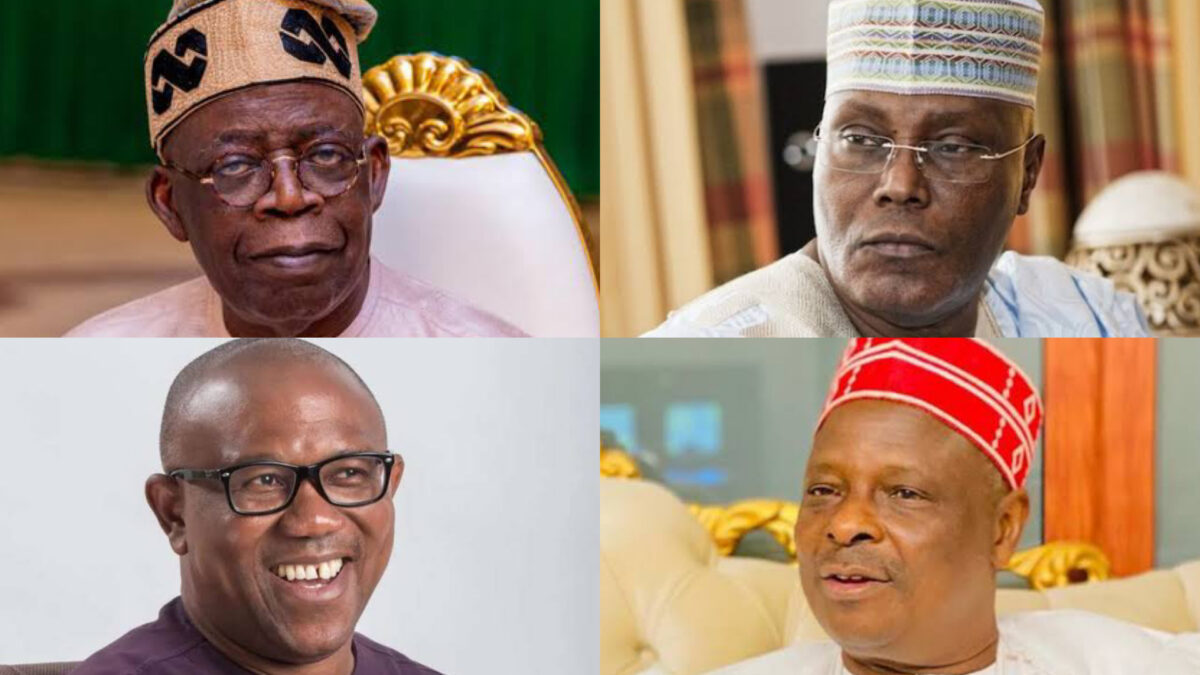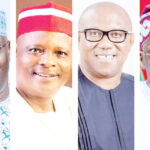A few days to their election, the presidential candidates are still criss-crossing the country demanding for Nigerians’ votes through open and media campaigns, and even engaging in local debates and international dialogues including signing peace accord with the National Peace Committee. Closely following on these engagements from a vantage point, the candidates have yet to put on an act to impress on how they will address the security challenges they are about to inherit and promote sustainable peace.
As the 2023 election is unique, though election promises are not legally enforceable, but serve as a moral bond for re-election, mentioning peace, security, development, empowerment of women and youth in the passing does not equate with wooing the hearts and minds of potential voters who have been directly or indirectly affected by the rising level of violent conflict, terrorism, injustice, exclusion, hate and human rights violations. As election is a central pillar of peacebuilding, telling voters you understand the structural causes, actors, trends and dynamics of conflict in Nigeria and systemic approach to address them will go a long way in attracting their votes.
Essentially, what we have heard so far were the political aspects of campaign in which were articulated in the parties’ manifestoes devoid of peacebuilding and conflict prevention policies. That is, given the experience the populace have gone through in the last few decades, they want to hear the peacebuilding tones, read conflict transformation templates and see political readiness of their soon-to-be president to tackle the myriads of violence, instead of the political mudslinging or inflammatory remarks and attacks that have dominated the campaigns.
While expressing concerns over the attitude and mindset of politicians at a 2-day roundtable on elections organised by the Nigerian Political Science Association, Prof. Attahiru Jega, the former Chairman of the Independent National Electoral Commission, expressed fears over the politicians’ manipulation of religion, ethnicity, judiciary and insecurity, among other issues for personal gains.
- NIGERIA DAILY: Why Is The 2023 Election So Important To Nigerians?
- Kwankwaso: Red cap revolutionist changing the tide
Statements or promises like “we will make terrorism a thing of the past”, “I will flush out Boko Haram”, and “I will fight banditry” should be followed by how. Nigerians did not wake up to see cultism, kidnapping, banditry, violent extremism, farmer-herder conflicts and secessionist agitations. Like its predecessors, the manifestos detailed the economy, employment, security and corruption features of our national lives, but fell short of specific elements that would have energised quite a sizeable number of voters who have lost family members and property to religious and communal violence. To convince the electorate, who were displaced from their homes and livelihoods, would require the candidates to concretely show they are ready to reverse the escalated level of criminal violence.
It behoves on the presidential candidates to display and impress about their knowledge, willingness and rare vision to address the underlying drivers of violent conflict and terrorism and build the unity of this country. Keen observer of Nigerian conflict dynamics would notice their pervasiveness and intractability in terms of the causes and dynamics. For instance, as the Chief Olusegun Obasanjo’s administration was transitioning to power in 1999, he attempted to address the injustice, human rights violations and marginalisation fomented during the long decades of military dictatorship through restorative justice. The Human Rights Violations Investigations Commission (otherwise known as the Oputa Panel) the administration set up at resolving and managing the past atrocities and compensating the victims through truth and reconciliation did not materialise as the panel’s reports were not released to the public, let alone implemented.
The resultant cases were the escalated ethnic militias, ethno-religious and criminal violence across Nigeria. Out of ethnic mistrust, revenge, political intolerance and grievances, Jos, Kaduna, Sagamu, and Niger Delta engulfed in crises. Much emanation of the cycles of violence that have destroyed thousands of lives and billion naira-worth of property can be referenced to this period. Seeking for the highest position in the land demands some genuine and practical explanation during the campaigns on how to address the challenges as the military intervention is no longer adequate to prevent and manage conflict, and build peace.
Though administrations after administrations have, to certain extent, deployed a number of conflict mitigation and prevention strategies but the drivers and triggers are still potent and widespread. The complex phenomena like the conflict and violence are in dire need of more political support to complement initiatives of government and civil society including international organisations at promoting stronger democratic institutions, rule of law, accountability, transparency and human rights. Some communities often relapsed into more violence as soon as they gained some respite. Prospective presidents should understand why such phenomenon and complexity persist.
What this means is that no peacebuilding plan and execution, no matter how noble, could succeed if there is no correspondent willingness of political power to make the initiative achieves its anticipated objectives and goal. I have heard prominent Nigerian peacebuilding practitioners lamenting the low result of their interventions because of little political buy-in. That is why the presidential candidates need to demonstrate, at this stage, their preparedness and seriousness that if they get the presidency, they will make it happen by supporting genuine initiatives to prevent and manage conflict.
As a people living in a place where violence erupts routinely, the voters deserve to understand their soon-to-be president’s knowledge on the underlying causes and drivers of conflict in the country. Likewise are the strategies each is going to deploy to mitigate the entrenched socio-economic and political problems fueling violence and conflict in the land. As vital as this phase of the election process is concerned, prospective voters would wish to know how the next president wishes to embark on the journey to change Nigerians’ behaviour and mindset in order to reverse the structural socio-cultural and political injustices that have marginalised women and youth in the society.
In other words, demonstrating understanding and seriousness may indicate to voters who might have been victims of violence the willingness that what caused their predicaments would be addressed.
Commitments could be made to dust the Oputa Panel reports, the 2014 national conference reports and the 2012 peace policy, and to embark on a long journey of social change. If these promises were offered to the people, it would go a long way to convince them rather than offering money or “stomach infrastructure”. Unveiling peace package and specific approach will address the accusations around desperation, ethnic and religious bigotry.
Since peacebuilding is a huge and complex undertaking, the vision of each candidate on how to promote tolerance, inclusion, conflict transformation in some respective communities and a commitment to culture of peace should be explicitly branded to encourage voters.
As we countdown to the February 25, candidates must be inclusive in thoughts and deeds and tolerant of opponents. This will demonstrate candidates’ peacebuilding ethos, abhorrence of winner-takes-all attitude, readiness to accept outcome of election, and indeed reflect the shade and colour of their presidency.
Babatunde, PhD, is with the Institute for Peace and Conflict Resolution, Abuja

 Join Daily Trust WhatsApp Community For Quick Access To News and Happenings Around You.
Join Daily Trust WhatsApp Community For Quick Access To News and Happenings Around You.


